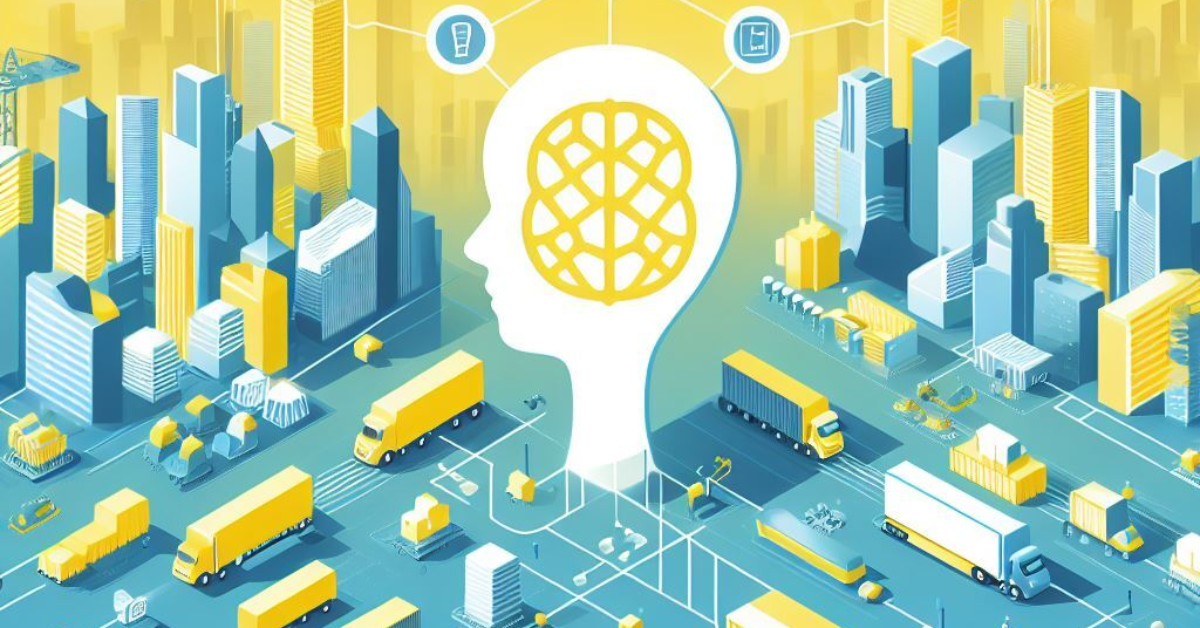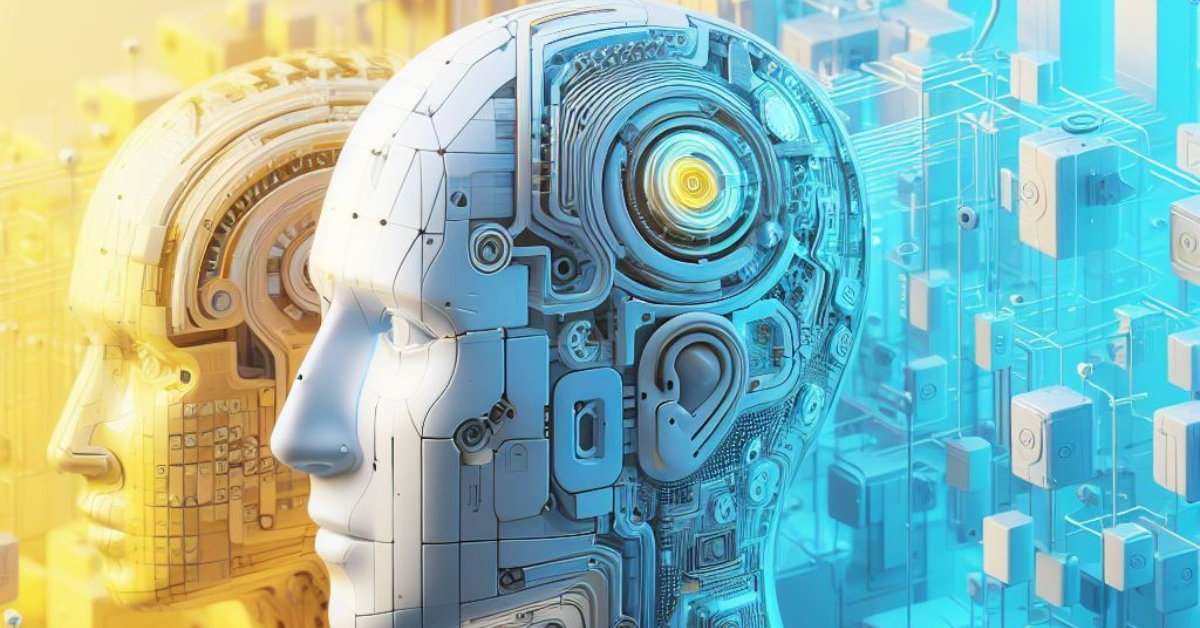The Future of AI in Supply Chain
September 27, 2023 | by insighttechdaily.com

Explore the transformative power of AI in supply chain management, from demand forecasting to sustainable logistics. Discover how AI is reshaping the future of logistics and supply chain operations
Artificial Intelligence (AI) has been making waves in nearly every industry, transforming the way we work and live. When it comes to supply chain management, AI’s impact has been particularly significant. In this comprehensive 5,000-word article, we will delve deep into the future of AI in supply chain management, exploring the latest trends, cutting-edge applications, challenges, and potential benefits.
In this Article
Introduction
In the world of supply chain management, efficiency, accuracy, and responsiveness are the keys to success. Traditional methods have their limitations, often leading to inefficiencies, excess costs, and customer dissatisfaction. This is where AI steps in, with its ability to analyze vast datasets, make predictions, and automate complex processes.
Defining AI in the Supply Chain
Artificial Intelligence in the supply chain refers to the use of advanced algorithms, machine learning, and data analytics to optimize various aspects of the supply chain, from demand forecasting and inventory management to logistics and quality control.
The Need for AI in Modern Supply Chains
The modern supply chain operates in a globalized and highly dynamic environment. Customer expectations are soaring, and market trends are changing rapidly. To stay competitive, businesses need to adopt agile and data-driven approaches, and AI offers the perfect solution.
AI-Powered Demand Forecasting
Demand forecasting is at the heart of supply chain planning. Accurate forecasts enable businesses to optimize their inventory levels, minimize stockouts, and reduce excess inventory costs. In this section, we will explore how AI is transforming demand forecasting.
Traditional vs. AI-Driven Forecasting
Traditional demand forecasting methods rely on historical data and often fail to consider external factors that can influence demand. AI, on the other hand, can analyze a wide range of data sources, including social media trends, weather patterns, and economic indicators, to make highly accurate predictions.
Benefits of Accurate Demand Forecasting
Accurate demand forecasting has far-reaching benefits. It enables businesses to optimize their production schedules, reduce carrying costs, and improve customer satisfaction by ensuring products are always available when needed.
Real-World Examples
We will examine real-world examples of companies that have successfully implemented AI-driven demand forecasting and the impact it has had on their operations and bottom line.
Enhanced Inventory Management
Efficient inventory management is crucial for businesses to maintain optimal stock levels while minimizing costs. AI’s role in inventory management extends beyond demand forecasting.
The Cost of Poor Inventory Management
Ineffective inventory management can lead to overstocking, tying up valuable capital, or understocking, resulting in lost sales and customer dissatisfaction. AI-driven systems can strike the perfect balance.
How AI Optimizes Inventory
AI-driven inventory management systems continuously monitor stock levels, demand fluctuations, and even market trends. By analyzing this data in real-time, these systems can make data-driven decisions regarding reorder points, order quantities, and stock allocation.
Case Studies in Efficient Inventory Management
We’ll explore case studies of companies that have leveraged AI to optimize their inventory management, showcasing how this technology has not only reduced costs but also improved overall supply chain efficiency.
Revolutionizing Logistics with AI (AI in Supply Chain)
Logistics and transportation are core components of supply chain management, and AI is reshaping the way goods are transported and delivered.
Route Optimization and Traffic Management (AI in Supply Chain)
AI algorithms can calculate the most efficient routes for deliveries, taking into account factors like traffic patterns, road conditions, and delivery windows. This not only saves time but also reduces fuel consumption and carbon emissions, aligning with sustainability goals.
Predictive Maintenance for Vehicles and Equipment
By monitoring vehicle and equipment health in real-time, AI can predict when maintenance is required, reducing unplanned downtime and ensuring that goods are delivered on time.
The Role of Drones and Autonomous Vehicles
AI has enabled the development of autonomous vehicles and drones that can be used for last-mile deliveries. We’ll discuss the advantages and challenges of incorporating these technologies into supply chain operations.
Quality Control and Assurance
Ensuring the quality of products throughout the supply chain is critical to maintaining customer trust and brand reputation. AI plays a pivotal role in quality control and assurance.
AI and Real-time Quality Monitoring
AI-powered sensors and computer vision technology can continuously monitor the quality of products in real-time. Any deviations from set quality standards can trigger immediate alerts, enabling swift corrective actions.
Reducing Defects and Waste
By identifying quality issues early in the production process, AI reduces the number of defective products, minimizes waste, and improves cost efficiency.
Ensuring Product Safety
We’ll also explore how AI is being used to ensure product safety, especially in industries where compliance with safety regulations is paramount, such as the food and pharmaceutical sectors.
Customer-Centric Supply Chains (AI in Supply Chain)
In an era where customer experience can be a key differentiator, AI can help businesses create supply chains that are more customer-centric.
Personalization and Customer Experience
AI can analyze customer data to personalize marketing efforts, leading to more effective campaigns and improved customer retention. We’ll delve into the strategies and tools used for personalization.
Chatbots and AI-Powered Customer Support
Chatbots and virtual assistants powered by AI provide 24/7 customer support, addressing queries and resolving issues promptly. We’ll explore how these AI-driven solutions enhance the customer experience.
The Future of E-commerce with AI
AI is also changing the landscape of e-commerce, with recommendation engines and automated customer service chatbots becoming standard features. We’ll discuss how AI is shaping the future of online shopping.
Sustainability and AI
Sustainability is a growing concern for businesses and consumers alike. AI can play a significant role in making supply chains more eco-friendly.
Reducing Carbon Footprints with AI
AI helps optimize transportation routes and modes, leading to reduced fuel consumption and lower carbon emissions. We’ll delve into case studies showcasing these sustainability gains.
Sustainable Sourcing and Ethical Practices
AI can assist in identifying sustainable sourcing options and ensuring adherence to ethical practices in the supply chain. We’ll explore how AI promotes responsible supply chain management.
Green Supply Chain Initiatives
We’ll discuss various green supply chain initiatives that businesses are adopting to align with sustainability goals and regulatory requirements.
AI in Risk Management (AI in Supply Chain)
Supply chain disruptions can have severe consequences, and AI is becoming a crucial tool in identifying and mitigating potential risks.
Identifying and Mitigating Supply Chain Risks
AI can analyze a multitude of data sources, including social media, news, and weather reports, to identify potential risks. We’ll explore how AI’s predictive capabilities can help businesses prepare for and mitigate disruptions.
Case Studies in Risk Reduction
We’ll delve into real-world examples of companies that have successfully used AI to minimize the impact of supply chain disruptions, from natural disasters to geopolitical events.
Preparing for Unforeseen Disruptions
In an increasingly interconnected world, unforeseen disruptions are becoming more common. AI’s ability to rapidly analyze and respond to emerging threats is a valuable asset for supply chain resilience.
Challenges in Implementing AI
While AI holds great promise, its implementation can be challenging. We’ll examine some of the hurdles that businesses may encounter.
Data Integration and Quality
Quality data is the lifeblood of AI systems. We’ll discuss the challenges of integrating data from various sources and ensuring its accuracy and consistency.
Cost and ROI Considerations
Investing in AI can be costly, and businesses need to assess the return on investment carefully. We’ll explore strategies for calculating and maximizing the ROI of AI implementations.
Skills Gap and Workforce Training
The successful adoption of AI requires a workforce with the right skills. We’ll discuss the challenges of bridging the skills gap and training employees to work alongside AI systems.
Ethical Considerations
As AI becomes more integrated into supply chain operations, ethical considerations come to the forefront.
Data Privacy and Security
AI systems require access to vast amounts of data, raising concerns about data privacy and security. We’ll explore strategies for protecting sensitive information.
Fairness and Bias in AI
AI algorithms can inadvertently perpetuate biases present in historical data. We’ll discuss the importance of fairness in AI and steps to mitigate bias.
Ethical AI Adoption Guidelines
We’ll examine ethical frameworks and guidelines that businesses can follow to ensure responsible AI adoption and usage.
The Future Outlook for AI in Supply Chain
What does the future hold for AI in supply chain management? In this section, we’ll gaze into the crystal ball and explore the exciting possibilities.
Industry Projections and Growth
We’ll look at industry projections and forecasts, shedding light on the expected growth of AI in the supply chain sector.
Emerging AI Technologies
From quantum computing to blockchain integration, we’ll discuss emerging technologies that could further enhance AI’s role in supply chain management as the future of AI in supply chain management
Preparing for the AI-Driven Future
Businesses that embrace AI today are positioning themselves for success in the future. We’ll provide actionable insights for companies looking to embark on their AI journey.
Conclusion
In conclusion, the future of AI in supply chain management is marked by unprecedented opportunities for efficiency, cost savings, sustainability, and customer satisfaction. As businesses continue to adopt AI-driven solutions, they position themselves as leaders in an ever-evolving marketplace.
The transformative power of AI is not just a choice; it’s a strategic imperative in the dynamic world of supply chain management. Embracing AI is the key to unlocking new levels of competitiveness and resilience in the supply chains of tomorrow.
Thank you for taking this comprehensive journey into the future of AI in the supply chain. As technology continues to advance, so will the possibilities and innovations in supply chain management.
For More Articles and learning AI, Please visit Artificial Intelligence
RELATED POSTS
View all

